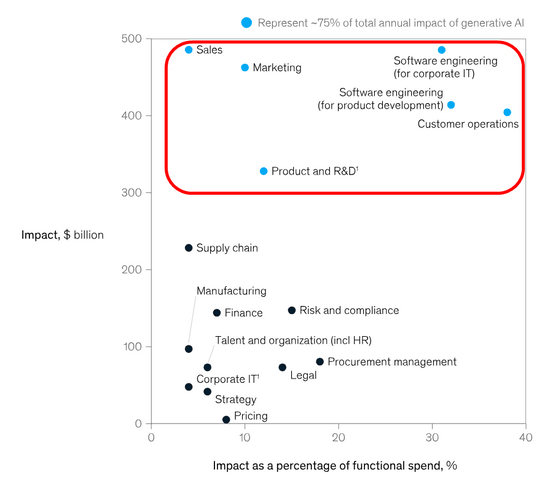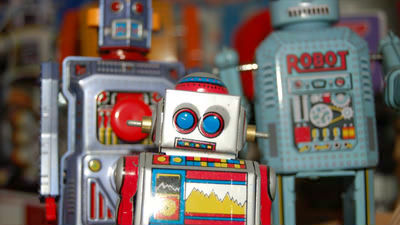Generative AI adds $6 trillion worth to global economy annually, McKinsey reports

Consulting firm McKinsey & Company said on June 14, 2023, that the value that generative AI adds to the global economy is ``$2.6 trillion (about 366 trillion yen) to $4.4 trillion (about 620 billion dollars) annually''. trillion yen)” was announced. This shows that the economic effect that AI, which continues to evolve at a rapid pace, will have on the world is an impact equivalent to the creation of an entire country on par with the United Kingdom.
Economic potential of generative AI | McKinsey
McKinsey: gen AI could add $4.4T annually to global economy | VentureBeat
https://venturebeat.com/ai/mckinsey-report-finds-generative-ai-could-add-up-to-4-4-trillion-a-year-to-the-global-economy/
In a report, McKinsey said generative AI was developing too quickly, making it difficult to gauge its impact on society. For example, ChatGPT, a chatbot equipped with a large-scale language model (LLM) and GPT-3.5, surprised the world with its performance and accuracy as soon as it appeared in November 2022. The next-generation LLM GPT-4 has been released with an incomparably improved performance.
Similarly, Anthropic's generative AI Claude , which emerged in March 2023 as a ChatGPT competitor capable of processing 9,000 tokens, will release 100,000 words in May, equivalent to the average novel length of 75,000 words. Token text can now be processed in 1 minute. In May, Google also announced PaLM 2 , a new generation LLM that will be installed in search technology fused with AI, Search Generative Experience, chatbot, Bard, etc.

by
To examine the economic impact of generative AI, McKinsey surveyed 850 occupations in 47 countries, representing 80% of the world's workforce, and 2,100 types of work performed by those in those occupations. We analyzed the potential impact. And we summarized the insights gained from the results as follows:
Generative AI adds enormous value to the global economy
According to McKinsey, generative AI is estimated to add $2.6 trillion to $4.4 trillion worth of value annually across 63 use cases. For reference, the UK's GDP in 2021 was $3.1 trillion (about 437 trillion yen). McKinsey points out that this estimate doubles further when considering the possibility of embedding generative AI in tasks other than the targeted use cases.
◆ 75% of the value provided by generative AI spans four areas
The four areas are specifically customer operations, marketing sales, software engineering, and research and development (R&D). For example, generative AI supports interaction with customers, enhances data usage and improves marketing and sales through SEO optimization, builds code with natural language prompts, and streamlines product development with accelerated simulation and testing. This is the case.

◆ Generative AI will have a major impact on all industrial fields
Banking, high tech, and life sciences are among the industries where generative AI is expected to have a significant impact on revenue. For example, if AI spreads to the banking industry, it is said that the value of $ 200 billion (about 28 trillion yen) to $ 340 billion (about 47 trillion yen) will be added annually. In addition, retail and consumer products have a potential impact of $ 400 billion (about 56 trillion yen) to $ 660 billion (about 93 trillion yen) annually.

◆ Generative AI strengthens the capabilities of individual workers by automating part of their work
McKinsey believes that AI can automate jobs that take up 60-70% of working hours. In particular, generative AI greatly improves the ability to understand natural language, which is necessary for work, which accounts for 25% of working hours, so it is expected to have a significant impact on the work of so- called knowledge workers , who have high wages and educational requirements. You can
The pace of workforce transformation will accelerate
According to McKinsey's AI introduction scenario, which takes into account the speed of technological development, economic feasibility, and the timeline for diffusion, between 2030 and 2060, half of the jobs in 2023 could be automated by AI. It is said that there is. The halfway point is 2045, a ten-year earlier schedule than previous estimates.
McKinsey sees generative AI as a “technology catalyst,” defining it as not only automating the industry but unlocking the creative potential of its employees.
Alex Skalevski, one of the report's co-authors and senior partner and global leader of McKinsey subsidiary QuantumBlack, said, 'I believe we are entering the age of creativity, the age of creators, so to speak. I will,” he commented.
Related Posts:
in Software, Posted by log1l_ks







